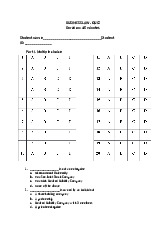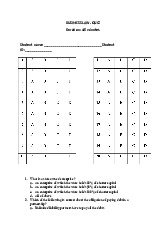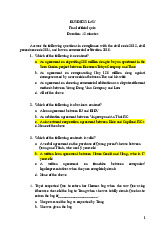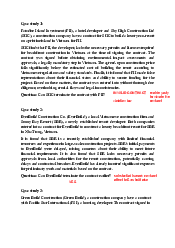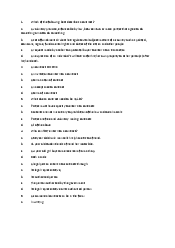



Preview text:
COURSE SYLLABUS
INTRODUCTION TO BUSINESS DATA ANALYTICS 1. Module Code: INS1053 2. Number of credits: 2 3. Pre-requisite(s): 4.
Teaching Language: English 5. Lecturer Information: No Name Title Institution Email Phone 1. Trần Đức Quỳnh TS VNU quynhtd@vnuis.edu.vn 0902266018 2. Trần Thị Oanh TS VNU oanhtt@vnuis.edu.vn 0362220684 Nguyễn Trọng nguyentrongkuong@gma 3. TS VNUA Kương 0867112989 il.com 6.
Main aim(s) of the module:
This course provides students fundamental methods of data analytics and some problems in business. 7.
Learning outcomes of the module:
On completion of this course you will be able to: For Knowledge:
1. Remember fundamental concepts in business analytics.
2. Understand the fundamental models in data science and the evaluation of model performance.
3. Understand some business problems that can be solved by using data science tools.
4. Understand job opportunuity in the field of business data analytic.
5. Apply statistics and machine learning methods to solve simple problems in business data analytics. For Skills and Attitude:
6. Ability to analyseing real problems in business and apply the data analytics tools to solve them.
7. Understanding of the importance of data analytics and sense of application of data science to
solve real problem, especially in business.
8. Ability to effectively communicate in English and improve the vocabular in information technology. 8. Assessment methods No Assessment items Value Notes 1 Attendence and report 20% 2 Mid-term exam 20% 1 hour written exam/report 3 Final exam 60% Written exam/Project Total 100% 9. Textbook(s):
[1] Data Science for Business: what you need to know about data mining and data analytic
thinking, 1st Edition, by Foster Provost and Tom Fawcett, ISBN: 978-1-449-36132-7
[2] Business analytics: Data analysis and decision making, 6th edition by S.Alright and
Wayne Winston, ISBN: 978-1305947542 10. Module’s description:
This course provides students with basic concepts and insights, an overview of data analysis and
applications of business data analysis. Students will be taught business problems that can be
solved with data analysis tools. In addition, students are also provided with the most general
knowledge about predictive models in data analysis and how to evaluate the performance of
model. Students are also informed job opportunities as well as scheme to implement data analysis projects through company tour. 11.
Course schedule / Teaching plan: Week Content Reference Learning Outcomes Chapter 1[1] & 1
Overview of business data analytics 1,2,7,8 Lecture note
Overview of business data analytics Chapter 1[1] & 2 1,3,6 Lecture notes Some problems in business Chapter 2[1] & 3 2, 3,8 Lecture notes Statistics in BDA Chaptee 3[1] & 4 1,2,3,8 Lecture notes Data preparation in BDA 5 Lectue notes 2,3,8 Chapter 3[1] and 6 Machine learning in BDA 2,3,8 Chapter 4[1]
Evaluating the performance of machine 7 Chapter 7[1] 1,2,3,8 learning methods 8
Real case and job opportunuity in the field Invited lecturer 1, 4, 5,7,8 of data science for business 9- 10 Company tour and report Company 1,4,5,7,8 Final Exam
Annex 2: Compatibility matrix between learning outcomes of the module and learning
outcomes of the program Score Module Machine learning (Bloom scale)
1.1. The basic contents of Marxism - Leninism, political and military defense and
security policies of the Communist Party of Vietnam in the period of renovation,
thought, morality, cultural values of Ho Chi Minh; have physical education
knowledge to ensure a good health.
1.2. Basic knowledge in the areas of mathematics, basic programming, sociology,
psychology, as the basis for the study of specialized modules and problems of data
and business analytics in practice.
1.3.1. Applying doctrines and laws of economics, how the market works, the role of
government in the economy to analyze and make business and investment decisions.
1.3.2. Summary of basic knowledge about business management organization, enterprise data analytics. 1. Knowledge
1.4.1. Implement planning, organize monitoring of operational management
processes, organizational information systems, quantitative methods in management,
databases in business analysis, monitor information security
1.4.2. Applying moral concepts in business, legal provisions on corporate
responsibility to consumers, intellectual property rights, project management.
1.5.1. Data analytics and modeling problems based on statistical and optimization mathematical tools.
1.5.2. Evaluating data in decision analysis by the use of informatics knowledge in 6
general and computer science in particular
1.5.3. Identify core issues in business and economics
1.5.4. Developing additional content for analyzing business data such as research methodology, team building … 2.1.1. Job skill 6
2.1.2. Ability to solve problems 6 2. Skill
2.1.3. Ability to research and discover knowledge 2.1.4. System thinking ability 2.1. Specialized 2.1.5. Social context skill 2.1.6. Organization context
2.1.7. Ability to apply skills and knowledge into practice 5
2.1.8. Creative capacity to develop and lead career change
2.2.1. Self-study skills, time management, lifelong learning 5 2.2.2. Team work 4
2.2.3. Management and leadership 2.2.4. Communication skills 2.2. Soft skill 2.2.5. Foreign language skills 4
2.2.6. Skills to lead entrepreneurship to create jobs 2.2.7. Critique skill
2.2.8. Analysis and evaluation skills 6 2.2.9. IT skills 3. Self- 3.1. Self-responsibility 5 control and 3.2. Guide to supervise others responsibility
3.3. Self-directing to draw conclusions and protect point of views 4
3.4. Planning to coordinate the management of resources
3.5. Research to improve operations 5 4.1. Personal moral qualities 4. Quality of moral attitude
4.2. Quality of professional ethics
4.3. Quality of social morality
